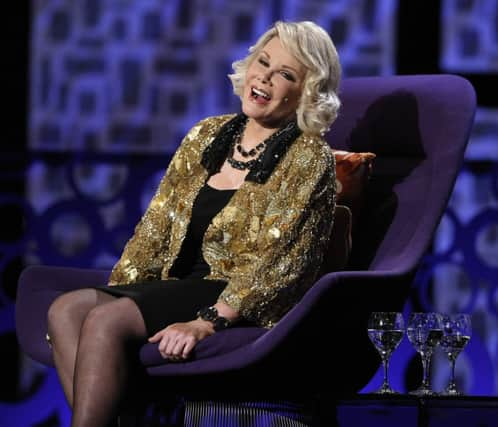Jane Bradley: Grieving for self promotion


Politicians, comedians, actors and members of the general public. There they are, as soon as the news breaks, all desperately anxious to air their views about the sad event.
The phenomenon struck recently, with the passing of elderly actress and comic Joan Rivers, prompting thousands, nay millions, of people worldwide, to register their own reaction to the event.
Advertisement
Hide AdAdvertisement
Hide AdA few months ago, however, it was the turn of popular politician Tony Benn. While I quite liked Mr Benn, who had lived a long and full life, I actually had to turn off Twitter for a few hours, so prolific and unnecessary were the “tributes”.
My favourite was from a guy who remembered fondly the time that he had met Benn in a leisure centre in Milton Keynes (or similar). On spotting that the chap was wearing swimming gear, Benn made the comment, “Enjoy your swim”. This, apparently, demonstrated what a GREAT MAN he was.
This random punter’s story had nothing to do with what those three words revealed about Mr Benn – what else could the poor bloke have said? The (quite frankly boring) anecdote served one purpose and one purpose alone: to tell the world “I once met Tony Benn”.
Of course, most of them were even more inane. “A sad day :-(” I saw literally hundreds of times. Well, duh. Others were extreme, using words such as “devastated”, “grief stricken” and “gutted” – but quickly following them up with an anecdote about the one time they “met Tony Benn”.
Perhaps more worryingly, however, the need to jump on the bandwagon of grief is not reserved purely for celebrity deaths.
Recently reading a Facebook tribute site for a teenager who had passed away in extremely tragic circumstances, I noticed that one boy had commented dozens of times. As her other friends expressed their heartbreak at the untimely death of the young lady, he replied to each of their messages with words such as “Good to hear your memories of her” and “She was an amazing person”. And I’m sure she was. But while an observer would be forgiven for thinking that this youngster was a close friend or relative – the girl’s brother, or perhaps her boyfriend – reading through his comments, it emerged she had apparently spoken to him twice.
This need for publicly recognised involvement comes from the idea that we are all celebrities. That the world is hanging on our every social media account to hear our opinions. If A. Swimmer from Milton Keynes met Tony Benn 20 years ago, then the world needs to know. It is their right.
If Joe Bloggs from Swindon once exchanged brief pleasantries with a young lady who months later was tragically killed, then of course he needs to reveal his connection with her to the general public.
Advertisement
Hide AdAdvertisement
Hide AdOn the other side of the coin, those in the public eye are now expected to make tributes: whether they want to or not.
When news broke that Mr Benn, whose mother was Scottish, had died, First Minister Alex Salmond immediately heralded him as an “outstanding figure” who had “reinvigorated grassroots politics”.
I would imagine they were not the same words used by Mr Salmond to describe the former cabinet minister a couple of years earlier when he voiced his opposition to Scottish independence.
But whatever his relationship with Mr Benn – and I’m sure in reality it was perfectly amicable – poor old Mr Salmond had to be seen to lead the tributes, whether he wanted to or not.
If he – or others in his situation – does not immediately jump to mark the death of a peer, the world immediately begins to judge: why have they not commented? Why have they not expressed their grief? What does that signify?
In reality, it means nothing. It means they may be deeply saddened by a colleague’s death and dealing with their grief privately.
It may be that they hardly knew the deceased and while sad that such a tragic event has occurred, it has not personally affected them.
Whatever the reason, it is their own and their own alone.
A tribute should be just that – a legitimate celebration of a person’s life. Not a way to self promote.